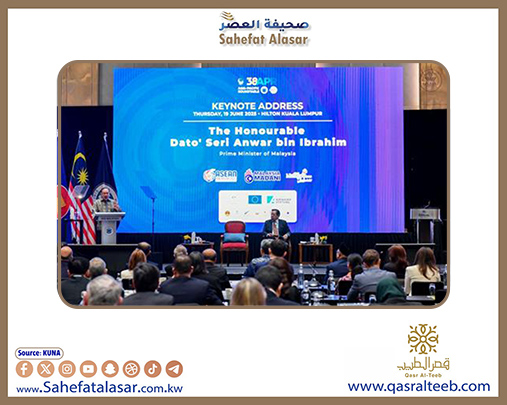


Malaysian Prime Minister Anwar Ibrahim stated on Thursday that the ongoing and unjustified airstrikes by Israeli occupation forces on Iranian territory constitute "a flagrant violation of international law and undermine the very foundations of the global order." He emphasized that such attacks deliberately sabotage dialogue opportunities, even during critical negotiation phases.
His remarks came during his keynote speech at the 38th Asia-Pacific Roundtable in Kuala Lumpur, which concludes today with participation from over 300 experts, policymakers, and academics—including ministers, ambassadors, and scholars—from nearly 20 countries.
Condemnation of Escalation and Call for Accountability
PM Ibrahim warned that such unilateral military actions, carried out without legal accountability, pose a direct threat to international stability. He urged influential global actors to "speak unequivocally and act decisively" to prevent further regional escalation.
Gaza Crisis: A Humanitarian Catastrophe
Expressing profound concern over Gaza’s worsening tragedy, Ibrahim condemned the relentless assault on a besieged and defenseless population, which has caused immense suffering and disproportionate civilian casualties—primarily women and children. He called for "immediate international action to enforce humanitarian law, secure a ceasefire, and ensure unfettered aid access."
Regional Flashpoints: South Asia, East Asia, and Beyond
South Asia: Unresolved India-Pakistan tensions remain a fragile fault line, with their future hinging not on past grievances but on "present choices: investing in stability or courting disaster."
East Asia: Rising tensions in the Taiwan Strait, Korean Peninsula, and South China Sea threaten to reignite conflicts. Malaysia advocates dialogue as the priority, where "the rule of law must prevail over chaos, and restraint over escalation."
Asia-Pacific Security and Economic Challenges
Ibrahim stressed that the region’s future depends not on exclusionary blocs but on a "predictable, rules-based security architecture." He defended "active non-alignment" as a legitimate and sustainable policy deserving global support.
On trade, he criticized the U.S. for imposing unilateral tariffs on Malaysian imports, warning such measures disrupt national and regional economies amid fragile global supply chains. However, Malaysia remains committed to constructive engagement with the U.S., China, the EU, India, and other partners to safeguard its interests.
BRICS and ASEAN: Pathways to Multilateralism
BRICS Expansion: Ibrahim hailed the inclusion of Middle Eastern, Southeast Asian, African, and Latin American nations in BRICS as an opportunity for "advanced, equitable partnerships," affirming Malaysia’s engagement as a testament to "strategic autonomy, not alignment."
ASEAN Leadership: As 2024 ASEAN Chair, Malaysia will advance economic integration through frameworks like the RCEP and the Digital Economy Agreement, while addressing crises—from border disputes to climate disasters—through collective action.
Myanmar: ASEAN’s Most Pressing Challenge
The ongoing civil war in Myanmar, Ibrahim noted, remains ASEAN’s most complex test. Malaysia, as Chair, will "activate all available mechanisms" to reduce violence and support a "Myanmar-led peace process."
Event Background
Hosted by Malaysia’s Institute of Strategic and International Studies (ISIS) from 17–19 June, the Roundtable featured nine plenary sessions on regional security, Myanmar’s crisis, geopolitical leadership, supply-chain shifts, and territorial sovereignty.